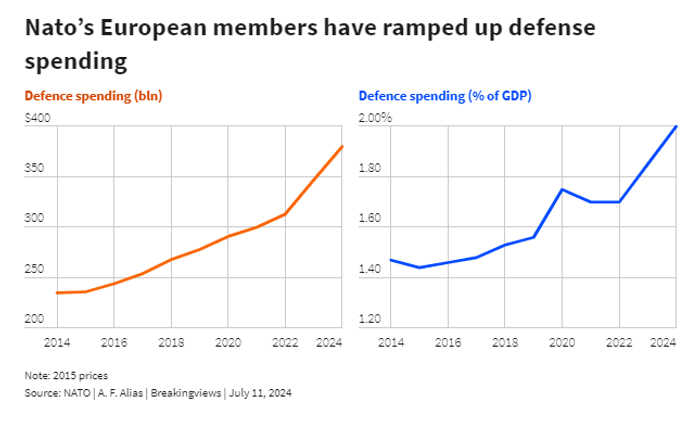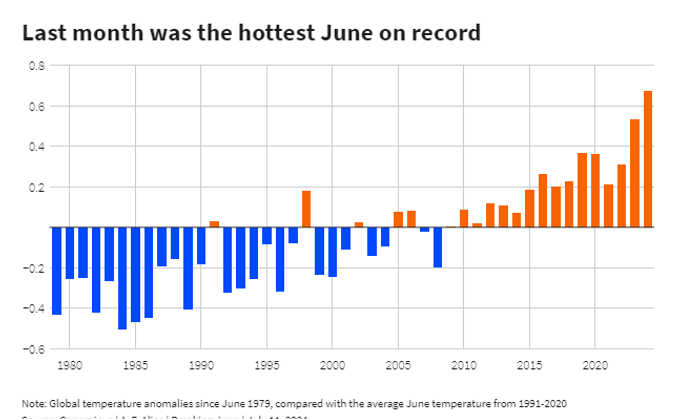Published 20:47 IST, July 15th 2024
World polycrisis hangs on US politics The Big View
The rest of the world watches the American scene with much at stake.
- Opinion
- 5 min read

Who will “run” the world?. The U.S. election has bystanders around the globe hanging on by a thread. The attempted assassination of former president and Republican frontrunner Donald Trump over the weekend is the latest shocking event that has unveiled the fragile political environment in the United States. The rest of the world watches the American scene with much at stake. Other countries cannot cast a ballot come November. But a Trump victory, which may now become more likely, would carry risks for Ukraine, world trade, and the planet.
The recent French, European Parliament, and UK elections have partly stabilised western Europe. France will remain a solid pillar of the European Union for now after the far-right National Rally failed to win parliamentary elections. The centrist pro-European parties in the European Parliament kept their majority, even though they lost ground to nationalist groups. Meanwhile, the UK now has a Labour government that is keen to work with the EU, especially on security, following a string of pro-Brexit Conservative prime ministers.
But these political contests are sideshows compared with who sits in the White House. The future of Ukraine, world trade, climate change, and relations between superpowers the United States and China depends to a great extent on whether Trump wins November’s election. That, in turn, is linked to whether the incumbent, Joe Biden, remains in the race as concerns about his age and mental agility mount.
The current occupant of the White House backs the North Atlantic Treaty Organization, believes in working with allies to stand up to Russian leader Vladimir Putin and Chinese President Xi Jinping, and is committed to fighting climate change. None of this can be said of Trump, who proudly promotes his “America First” approach to foreign policy, promising to crack down on Chinese trade more aggressively than the current administration.
From Atlantic to Pacific
The most immediate risk of a Trump presidency is that he could force Ukraine to cut a peace deal with Russia, which hands a victory to Putin. The former president’s allies in Congress successfully held up until April the supply of weapons to Kyiv. Two of his key advisers recently presented him with a plan to end the war that involves telling Kyiv it will only get more U.S. weapons if it enters peace talks, one of the advisers told Reuters. Trump’s key spokesperson distanced the candidate from the story. But the Republican nominee has also said he would “encourage [Russia] to do whatever the hell they want” with NATO members that don’t spend enough on defence.
The alliance put on a show of unity at its summit in Washington last week, promising more support for Ukraine including an “irreversible path” to NATO membership. But the congregating group knows their future hinges on the potential next president who wasn’t in the room.
European countries would struggle to defend Ukraine on their own. U.S. defence spending last year was more than double that of all the other NATO members combined. Although many countries are beefing up military forces, most are not moving rapidly enough: the new UK government will only increase this part of the budget to 2.5% of GDP when it can afford to, while the German defence minister has complained that his allotted amount for next year is “significantly less” than he had sought.

What’s more, the risks of a weak approach to Russia extend beyond Ukraine. Beijing is Moscow’s key ally – or in NATO’s words, a “decisive enabler" of its war effort, providing it with weapons components, equipment, and raw materials. If Trump pushes Ukraine to give ground to Putin, Xi may feel emboldened to flex his muscles in Asia - especially Taiwan and the South China Sea.
Geoeconomic risks
The risks of a Trump presidency extend beyond geopolitics to trade and climate. Biden is hardly a proponent of open trade. He has heavily subsidised the U.S.-based semiconductor industry and green tech industries, causing squeals of complaint from traditional allies. He has also hiked tariffs on Chinese-made electric vehicle batteries and some other goods.
But Trump’s threats make his opponent’s protectionist policies look like a mere slap on the wrist. The Republican nominee has proposed 10% tariffs on imports from anywhere and a tax of at least 60% on all goods from China. This would cause havoc to the world trading system.
There would also be a sharp difference of view on climate change. Global temperatures could reach another record this year, and people are dying from extreme heat across the world from the United States and India to China and Saudi Arabia.
Biden’s ambitious plans to combat rising temperatures took a back seat following Russia’s invasion of Ukraine. But if the Democrats hold on to the White House, there could be new impetus behind ideas such as scaling up the World Bank to fight climate change and mobilising private capital to invest in renewable energy in developing countries. There may even be the basis for a pact between the United States and China, the world’s biggest carbon polluters, to go faster in curbing emissions.
By contrast, Trump has been proudly and dangerously contrarian on climate change. He pulled the United States out of the Paris climate agreement when he was president. He also promised a group of top oil executives in April to scrap dozens of Biden’s environmental rules if they raised $1 billion to get him back in the White House, the Washington Post reported citing people with knowledge of the meeting.

Their choice, our problem
Many American supporters of Trump see global wealth and power as a zero sum game. The more the United States squeezes allies in Europe and elsewhere, the more they think America itself will gain. This is a worrying mentality when the world is facing so many interconnected crises.
Americans are right that their choice come November will have a dramatic effect on how the world shapes up. For those outside of the United States, even as they condemn the attempted assassination, there’s little they can do except watch and hope.
Updated 20:49 IST, July 15th 2024